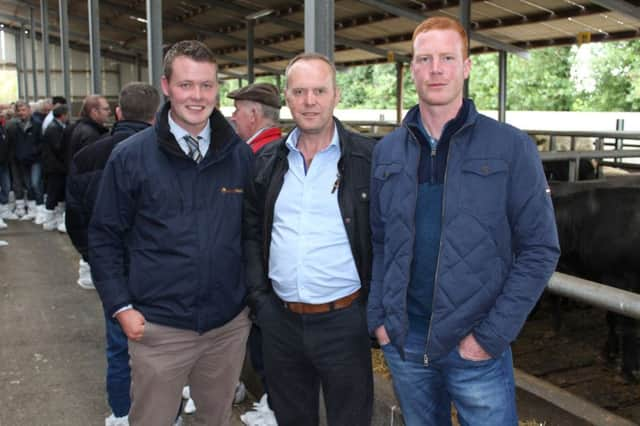NI beef finishers travel to Meath to view facilities at Kepak Farm


The event provided the visiting group with an opportunity to gauge the latest techniques, where the management of finishing cattle are concerned.
United Feeds’ business development adviser, Andrew Fyffe takes up the story.
Advertisement
Advertisement
“Beef finishers will be buying-in stores at the present time, to finish as beef for the Christmas market. Invariably, these animals will be mixed together in marts and then brought back to totally new surroundings. As a consequence, their stress levels will be sky high.
“At the Kepak farm, it is policy to allow the new arrivals settle-in for at least a day or two in a well ventilated, straw bedded house before putting them into the crush to vaccinate, worm and fluke them.
“This is an approach that I would fully endorse.”
He added: “During this period and ideally for up to three weeks after arrival on farm these animals need to be nurtured with specific focus on their diet to minimise digestive upsets. At United Feeds we strongly encourage our customers to consider the finishing period on their farm in two stages – the adaption phase and the finishing phase and we have specific advice and nutritional solutions for each phase.
“When this adaption period is over and the cattle are settled on the finishing diet it is critical for a consistent approach to be adopted. In practical terms, this means feeding the exact same ration at the same times each day.”
Advertisement
Advertisement
Andrew stressed the importance of feeding rations that will deliver optimal performance levels.
“Silage quality will be extremely variable across the country this winter, particularly as many beef finishers have yet to get a second cut ensiled. Ensuring that diets have the required protein levels to drive energy intakes and feed conversions is a priority,” he said.
“Many beef farmers will include silage and/or a selection of food wastes as the basic constituents of the rations they offer finishing cattle.
“At United Feeds we offer a bespoke service which takes account of the specific feeding materials already available on-farm and how these can then be balanced with a concentrate that helps secure the highest possible levels of daily liveweight gain.”
Advertisement
Advertisement
In order to achieve this Andrew confirmed the benefit of including Yea-Sacc® yeast right through the entire finishing period. Yea-Sacc® has been proven, courtesy of several independent trials through universities such as Harper Adams, to increase daily liveweight gain more efficiently with 10% more beef secured at the end of the finishing period.
He concluded: “One of the issues that became very obvious, courtesy of the visits, is the need to ensure that cattle receive the correct balance of trace minerals and vitamins throughout the adaption and finishing periods.
“What’s more, these crucially important components of the diet should be included in a wholly bioavailable form, in order to have maximum impact.
“It is for this reason that we are now including the HerdCare mineral package within our beef diets, on request. This contains trace minerals, such as copper and zinc, in a Bioplex form only.
Advertisement
Advertisement
“It is an approach that has worked tremendously well within the dairy sector, where it is now regarded as accepted practice on a significant number of farms.”
For more information on beef feeding this autumn contact your local United Feeds adviser or customer services on 028 9075 9000